|
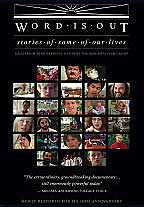
Word
Is Out
Stories Of Some Our Lives
Millarium
Zero / Milestone,
1978
A
film by the Mariposa Film Group:
Peter Adair, Nancy Adair, Andrew Brown, Rob Epstein, Lucy Massie Phenix,
Veronica Selver.
Starring
Achebe "Betty" Powell, Ann Samsell, Bernice "Whitey" Fladden, Cynthia
Gair, David Gillon, Dennis Chiu, Donald Hackett, Elsa Gidlow, Freddy Gray,
George Mendenhall, Harry Hay, John Burnside, Linda Marco, Michael Mintz,
Mark Pinney, Nadine Armijo, Nathaniel Dorsky, Pam Jackson, Pat Bond, Rick
Stokes, Roger Harkenrider (Tom Fitzpatrick), Rusty Millington, Sally M.
Gearhart, Tede Mathews, Trish Nugent
Unrated,
132 minutes
|
The
Way We Were
by
Michael D. Klemm
Posted online, July 2010
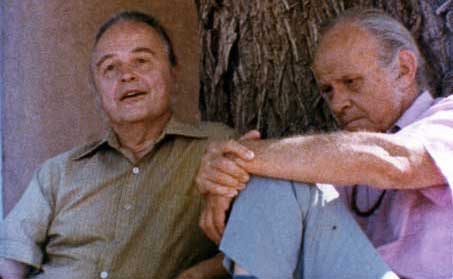
Documentaries
about the gay experience are fairly common today but this was not
the case in 1977 when Word Is Out: Stories
Of Some Our Lives premiered at the Castro Street Theater
in San Francisco. Word Is Out
was the first positive American documentary ever made about homosexuality,
and it was also the first to be produced and directed entirely by gay
filmmakers. In honor of its 30th anniversary, the film has been restored
and now it has been released as a special edition DVD.
|
|
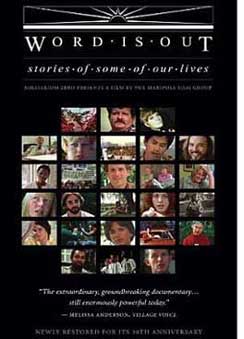 Word
Is Out
is an impressive historical document from the Mariposa Film Group, led
by director Peter Adair. This was a true film collective; Adair shared
the directing, interviewing, filming and editing duties with his sister
Nancy Adair, Andrew Brown, Lucy Massie Phenix, Veronica Selver and Rob
Epstein (who would later direct The Times Of Harvey Milk, Common
Threads: Stories From The Quilt and The
Celluloid Closet). Together, they interviewed over 100 subjects
before finally deciding on 26 gay men and women from myriad backgrounds,
ages and races to share their stories for the camera. Word
Is Out
is an impressive historical document from the Mariposa Film Group, led
by director Peter Adair. This was a true film collective; Adair shared
the directing, interviewing, filming and editing duties with his sister
Nancy Adair, Andrew Brown, Lucy Massie Phenix, Veronica Selver and Rob
Epstein (who would later direct The Times Of Harvey Milk, Common
Threads: Stories From The Quilt and The
Celluloid Closet). Together, they interviewed over 100 subjects
before finally deciding on 26 gay men and women from myriad backgrounds,
ages and races to share their stories for the camera.
Given
the time, the film's participants are to be commended for both their candor
and their courage. The gay civil rights movement was still in its infancy
and their voices were ones that desperately needed hearing. The era's
mass media wasn't exactly charitable towards gay people. Vito Russo wrote
in The Celluloid Closet that we were "starving" for positive images
and visibility on the screen, and Word Is
Out was more than just a tentative step in that direction.
It was a giant leap.
|
|
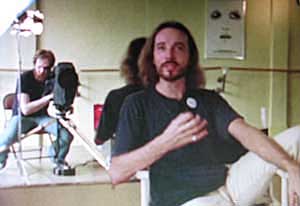 As
one of the film's subjects points out: "To the doctor, you were sick;
to the lawyer, you were criminal; and to the minister you were wicked."
All of this would have sounded depressingly familiar and hearing these
tales must have been cathartic to the film's first audiences. The 26 participants
share many similar stories. A surprising number came from small towns.
Many were once married because they bought into societal demands, did
what they were expected to do, and then wondered what it was that was
missing in their lives. Some led difficult lives but, for the most part,
Word Is Out dispelled the
lie that all homosexuals were unhappy, maladjusted people who lived in
the shadows. As
one of the film's subjects points out: "To the doctor, you were sick;
to the lawyer, you were criminal; and to the minister you were wicked."
All of this would have sounded depressingly familiar and hearing these
tales must have been cathartic to the film's first audiences. The 26 participants
share many similar stories. A surprising number came from small towns.
Many were once married because they bought into societal demands, did
what they were expected to do, and then wondered what it was that was
missing in their lives. Some led difficult lives but, for the most part,
Word Is Out dispelled the
lie that all homosexuals were unhappy, maladjusted people who lived in
the shadows.
|
|
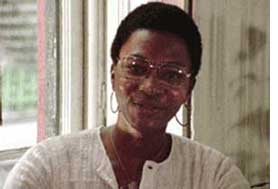 Although
one of the women expresses concern because she is the only black
lesbian in the movie, the film is noteworthy for its inclusiveness. Films
of this nature often tended to be rather white - usually white and male.
Here, the male to female ratio is pretty much split down the middle, with
a very androgynous teen thrown in for good measure. At least one of the
women is Hispanic, two of the men are black, and one is even Asian. (In
the more recent documentary, Fabulous:
The Story Of Queer Cinema, filmmaker Arthur Dong remarks that
he was amazed to find himself represented when he saw an Asian man in
Word Is Out.) Several of
the participants are seen with their partners; one white dude has a black
boyfriend. Their ages go all over the spectrum. Although
one of the women expresses concern because she is the only black
lesbian in the movie, the film is noteworthy for its inclusiveness. Films
of this nature often tended to be rather white - usually white and male.
Here, the male to female ratio is pretty much split down the middle, with
a very androgynous teen thrown in for good measure. At least one of the
women is Hispanic, two of the men are black, and one is even Asian. (In
the more recent documentary, Fabulous:
The Story Of Queer Cinema, filmmaker Arthur Dong remarks that
he was amazed to find himself represented when he saw an Asian man in
Word Is Out.) Several of
the participants are seen with their partners; one white dude has a black
boyfriend. Their ages go all over the spectrum.
|
|
Old
photos are sometimes cut in, there are a few musical segments and the
film ends with footage from a San Francisco pride parade, but most of
its running length consists entirely of the interviews themselves. The
settings are as varied as the people - a dance studio, a cabin, an idyllic
park. A businessman named Mark Pinney wears a suit, sits behind a desk
in his office and looks very conservative while Betty Powell, the black
lesbian, displays a "Black Power" fist inside the feminine circle/cross
symbol on her window. Another woman is seen taking down a tree with a
chainsaw.
|
|
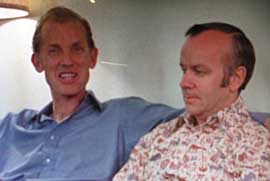 Many
of the participants came of age during very oppressive times; namely the
1940s and 50s. A man named Rick Stokes relates a number of horror stories.
Though he was married, he also enjoyed a sexual relationship with his
boyhood friend. When this was discovered, Stokes' father-in-law had him
committed to a mental hospital where his doctor told him that they could
castrate him but they'll try some treatments first. He speaks of
having repeated shock treatments. A woman, identified only as Whitey,
talks about "escaping" to Greenwich Village from the small town where
she lived. She was only a teenager; her father found her and put her in
a state hospital for the insane where the threat of shock treatments was
used to keep her in line. She also mentions a psychiatrist who prescribed
a diet of green salads in order to make her straight. Many
of the participants came of age during very oppressive times; namely the
1940s and 50s. A man named Rick Stokes relates a number of horror stories.
Though he was married, he also enjoyed a sexual relationship with his
boyhood friend. When this was discovered, Stokes' father-in-law had him
committed to a mental hospital where his doctor told him that they could
castrate him but they'll try some treatments first. He speaks of
having repeated shock treatments. A woman, identified only as Whitey,
talks about "escaping" to Greenwich Village from the small town where
she lived. She was only a teenager; her father found her and put her in
a state hospital for the insane where the threat of shock treatments was
used to keep her in line. She also mentions a psychiatrist who prescribed
a diet of green salads in order to make her straight.
|
|
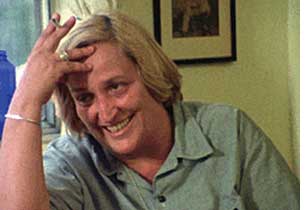 For
Pat Bond, "the thing to do was escape into the Women's Army Corps and
go to Paris where Gertrude Stein had been." She talks of the Army recruiter
looking like "all my old gym teachers in drag" and how all the women who
were enlisting wore argyle socks and pin-striped suits and had their hair
cut like men. She describes the pressure to look butch in the Army and
comically demonstrates walking like John Wayne. But then she talks of
crackdowns, and 500 women in Tokyo being sent home on dishonorable discharges.
She is happy that times have gotten a bit more liberal but, having
lived through McCarthyism and the Army inquisitions, it scares her that
the brave people who are coming out now might be on some list in another
ten years if things get bad again. Things did get worse again
of course; but one thing that she couldn't possibly foresee was the coming
of the AIDS pandemic. For
Pat Bond, "the thing to do was escape into the Women's Army Corps and
go to Paris where Gertrude Stein had been." She talks of the Army recruiter
looking like "all my old gym teachers in drag" and how all the women who
were enlisting wore argyle socks and pin-striped suits and had their hair
cut like men. She describes the pressure to look butch in the Army and
comically demonstrates walking like John Wayne. But then she talks of
crackdowns, and 500 women in Tokyo being sent home on dishonorable discharges.
She is happy that times have gotten a bit more liberal but, having
lived through McCarthyism and the Army inquisitions, it scares her that
the brave people who are coming out now might be on some list in another
ten years if things get bad again. Things did get worse again
of course; but one thing that she couldn't possibly foresee was the coming
of the AIDS pandemic.
|
|
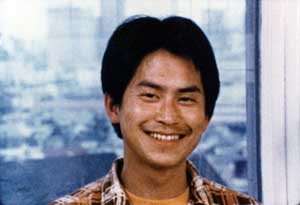 The
film is never boring and the talking heads are refreshingly honest. They
bare their souls, often holding nothing back. Some of this is painful.
One man weeps, overcome with emotion, as he recounts police harassment
and "nelly queen" drag solidarity in a 1950s gay bar. Two women from broken
marriages became a couple when they babysat each other's kids. Their unique,
and nourishing, family was ripped apart when one of the ex-husbands sued
for custody and the mothers had no legal recourse. Much of Word
Is Out is also funny and many of these witnesses to history
have terrific senses of humor - some of it undoubtedly the result of years
of having to thicken their skins. Dennis Chiu, whose many randy comments
add considerable mirth, talks about insults to his Chinese heritage while
growing up and how it helped him to deal with later being called a fag. The
film is never boring and the talking heads are refreshingly honest. They
bare their souls, often holding nothing back. Some of this is painful.
One man weeps, overcome with emotion, as he recounts police harassment
and "nelly queen" drag solidarity in a 1950s gay bar. Two women from broken
marriages became a couple when they babysat each other's kids. Their unique,
and nourishing, family was ripped apart when one of the ex-husbands sued
for custody and the mothers had no legal recourse. Much of Word
Is Out is also funny and many of these witnesses to history
have terrific senses of humor - some of it undoubtedly the result of years
of having to thicken their skins. Dennis Chiu, whose many randy comments
add considerable mirth, talks about insults to his Chinese heritage while
growing up and how it helped him to deal with later being called a fag.
|
|
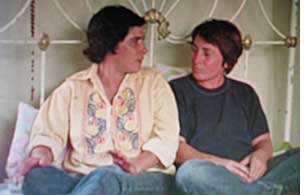 The
emphasis seems to be more on personal stories rather than activism. Harry
Hay is interviewed but his role in the founding of both the Mattachine
Society and the Radical Fearies, oddly, never comes up. Rick Stokes is
seen, near the conclusion, campaigning for office but the film doesn't
mention his political connections with Harvey
Milk. Sally M. Gearhart talks about the closet but her feminist science
fiction novels are omitted. Perhaps it was the filmmakers' intentions
to eschew celebrity and present their large cast as just simple people.
The participants' names are identified underneath thumbnail photographs
at the beginning of parts one and two, but are not displayed during any
of the interviews. The
emphasis seems to be more on personal stories rather than activism. Harry
Hay is interviewed but his role in the founding of both the Mattachine
Society and the Radical Fearies, oddly, never comes up. Rick Stokes is
seen, near the conclusion, campaigning for office but the film doesn't
mention his political connections with Harvey
Milk. Sally M. Gearhart talks about the closet but her feminist science
fiction novels are omitted. Perhaps it was the filmmakers' intentions
to eschew celebrity and present their large cast as just simple people.
The participants' names are identified underneath thumbnail photographs
at the beginning of parts one and two, but are not displayed during any
of the interviews.
|
|
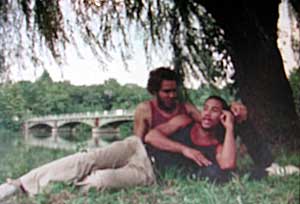 Word
Is Out is not a dry time capsule; it is a vital
and entertaining document that hasn't lost its edge, even after more than
three decades. Because the movie was made before AIDS, some might dismiss
it as being dated but this is hardly the case at all. The issues addressed
by the principals still haunt us today and many gay people still endure
a torturous coming out process. Homosexuality might not be reason enough
to be institutionalized anymore but teens are often sent to Ex-Gay camps
to be deprogrammed, gay parents still lose custody of their children,
and gays are still being drummed out of the military. Word
Is Out is not a dry time capsule; it is a vital
and entertaining document that hasn't lost its edge, even after more than
three decades. Because the movie was made before AIDS, some might dismiss
it as being dated but this is hardly the case at all. The issues addressed
by the principals still haunt us today and many gay people still endure
a torturous coming out process. Homosexuality might not be reason enough
to be institutionalized anymore but teens are often sent to Ex-Gay camps
to be deprogrammed, gay parents still lose custody of their children,
and gays are still being drummed out of the military.
|
|
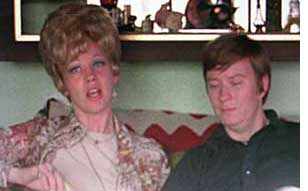 Word
Is Out
is also, quite frankly, a superbly structured documentary that set a high
bar for all the films that would someday follow in its fabulous footsteps.
Its restoration by the Outfest
Legacy Project is most welcome. They did an admirable job and the
film looks and sounds terrific. The extras on the DVD are worthy additions
to the main attraction and most of the surviving principals (both in front
and behind the camera) are represented. They discuss their working methods
and how director Peter Adair assembled his team, some of whom had never
worked on a film before. But they were gay and shared his enthusiasm for
the project, and so he taught them how to use the camera and become filmmakers.
Each filmed and conducted the interviews themselves and established an
atmosphere of trust with their subjects. Word
Is Out
is also, quite frankly, a superbly structured documentary that set a high
bar for all the films that would someday follow in its fabulous footsteps.
Its restoration by the Outfest
Legacy Project is most welcome. They did an admirable job and the
film looks and sounds terrific. The extras on the DVD are worthy additions
to the main attraction and most of the surviving principals (both in front
and behind the camera) are represented. They discuss their working methods
and how director Peter Adair assembled his team, some of whom had never
worked on a film before. But they were gay and shared his enthusiasm for
the project, and so he taught them how to use the camera and become filmmakers.
Each filmed and conducted the interviews themselves and established an
atmosphere of trust with their subjects.
|
|
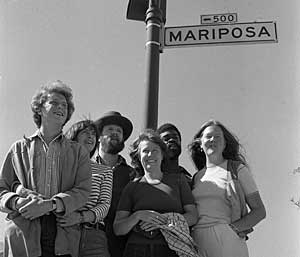 This
is not to say that none of the participants questioned their motives.
The lines of reality and cinema blur during one of Word
Is Out's most interesting moments when Elsa Gidlow, the
film's oldest subject, asserts her identity and confronts the filmmakers'
methods. "You want to fit me into a structure which you have," she says.
"Just as if I'm writing a novel, or you're writing a novel. We use our
characters that way. We want to fit them into this work of art; you have
a structure and you want to fit your characters into it. But this
[she points to herself] happens to be a character that doesn't want to
be pushed around or put into a context where she doesn't feel it's true
to her." (Perhaps she had seen the notorious 1967 CBS television documentary,
The Homosexuals, and was aware of how several of the interviews
had been re-edited in such a way that distorted the original meaning.) This
is not to say that none of the participants questioned their motives.
The lines of reality and cinema blur during one of Word
Is Out's most interesting moments when Elsa Gidlow, the
film's oldest subject, asserts her identity and confronts the filmmakers'
methods. "You want to fit me into a structure which you have," she says.
"Just as if I'm writing a novel, or you're writing a novel. We use our
characters that way. We want to fit them into this work of art; you have
a structure and you want to fit your characters into it. But this
[she points to herself] happens to be a character that doesn't want to
be pushed around or put into a context where she doesn't feel it's true
to her." (Perhaps she had seen the notorious 1967 CBS television documentary,
The Homosexuals, and was aware of how several of the interviews
had been re-edited in such a way that distorted the original meaning.)
It goes
without saying that audiences of the day must have been pleased to see
themselves in at least one of the people interviewed on screen. If I had
been out back in 1977, and had seen the film then, I would have identified
with the student who didn't want to be called a sissy "because sissy meant
girl and [he] wasn't a girl." (True confessions time: throughout high
school I had to put up with being called "Klemm the fem" and was so far
in the closet as a result that I didn't even figure out that I was gay
until I went to college.)
|
|
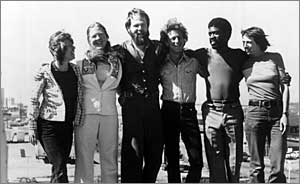 In
1967, Peter Adair made an acclaimed documentary entitled Holy Ghost
People about a Pentecostal service, complete with snake handling,
in the Appalachians. He worked on Word Is
Out from 1975-1977. In 1984, Adair was a consultant and
cameraman on his former Mariposa cohort Rob
Epstein's Oscar winning documentary, The Times of Harvey Milk.
In 1986, he co-directed, with Epstein, The AIDS Show: Artists
Involved in Death and Survival, one of the first films that examined
the impact of AIDS on the arts community, in 1986. When Adair was himself
diagnosed with AIDS, he wrote and directed Absolutely Positive
(1991). He died in 1996 at the age of 52. In
1967, Peter Adair made an acclaimed documentary entitled Holy Ghost
People about a Pentecostal service, complete with snake handling,
in the Appalachians. He worked on Word Is
Out from 1975-1977. In 1984, Adair was a consultant and
cameraman on his former Mariposa cohort Rob
Epstein's Oscar winning documentary, The Times of Harvey Milk.
In 1986, he co-directed, with Epstein, The AIDS Show: Artists
Involved in Death and Survival, one of the first films that examined
the impact of AIDS on the arts community, in 1986. When Adair was himself
diagnosed with AIDS, he wrote and directed Absolutely Positive
(1991). He died in 1996 at the age of 52.
The
filmmakers want to hear your stories. To contribute, log on to
Wordisoutmovie.com.
See
also these documentaries:
Before Stonewall
After Stonewall
|

